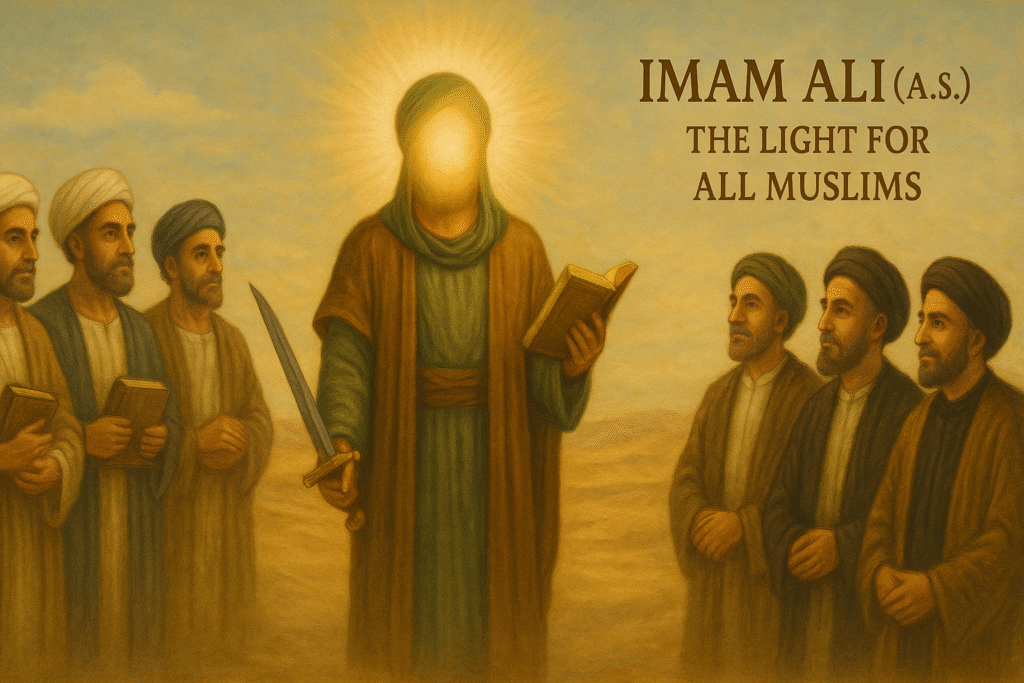Table of Contents
- Introduction
- Who Was Imam Ali (A.S.)?
- Sunni Perspective on Imam Ali (A.S.)
- Shia Perspective on Imam Ali (A.S.)
- Shared Qualities Admired by Both Schools
- Scholarly Quotes: Sunni and Shia Voices
- Imam Ali’s Role in Islamic Governance
- Imam Ali’s Knowledge and Spiritual Rank
- Debates on Leadership: Sunni vs Shia View
- Lessons from Imam Ali for All Muslims
- Duas & Ziyarat Lines about Imam Ali
- FAQs
- Conclusion
- References
1. Introduction
Imam Ali ibn Abi Talib (A.S.), cousin and son-in-law of Prophet Muhammad (PBUH), holds a unique and exalted status across all Islamic traditions. While Sunni and Shia scholars differ in theological and historical perspectives, both regard Imam Ali as a man of unmatched piety, courage, and wisdom.
This article explores how Sunni and Shia scholars view Imam Ali (A.S.), highlighting both common ground and respectful differences, in an effort to foster understanding and unity.
2. Who Was Imam Ali (A.S.)?
- Born in the Kaaba in Mecca, 600 CE
- First male to accept Islam
- Married to Bibi Fatima (S.A.), the Prophet’s beloved daughter
- Father of Imam Hasan (A.S.) and Imam Hussain (A.S.)
- Fourth Caliph (Sunni view)
- First Imam (Shia view)
- Known for his bravery in battles like Badr, Uhud, Khandaq
Imam Ali was not only a warrior but a man of deep knowledge and divine insight.
3. Sunni Perspective on Imam Ali (A.S.)
Sunni scholars honor Imam Ali as:
- The fourth Rightly Guided Caliph (Al-Khulafa al-Rashidun)
- One of the ten promised Paradise (Ashra Mubasharah)
- A companion of deep trust and wisdom
- A powerful warrior and close family of the Prophet
Notable Sunni Scholars on Imam Ali:
- Imam Ahmad ibn Hanbal: “None among the companions was more truthful than Ali.”
- Imam Shafi’i: “I am a partisan of Ali, and I love him.”
- Al-Dhahabi (Sunni historian): “Ali was among the bravest of the brave, and a man of righteousness and depth.”
4. Shia Perspective on Imam Ali (A.S.)
Shia Muslims believe Imam Ali was:
- The immediate successor of Prophet Muhammad by divine appointment (Nass)
- The first Imam of the Twelve Imams
- Infallible (Ma’soom)
- Possessor of Ilm-e-Ladunni (divine knowledge)
- The gateway to the city of knowledge, as per Hadith
Key Shia Beliefs:
- Ghadir Khumm: Prophet said, “Man kuntu mawlahu, fa Aliyyun mawlahu”
(Whoever I am master of, Ali is his master)
— Seen as clear evidence of Imamat - Imam Ali’s sermons in Nahjul Balagha are central to Shia theology and spirituality.
5. Shared Qualities Admired by Both Schools
Despite theological differences, both Sunni and Shia scholars agree on:
- Ali’s knowledge of the Qur’an
- His unparalleled bravery
- His humble lifestyle
- His justice and fairness as a ruler
- His love and service to the Prophet (PBUH)
This makes Imam Ali a unifying figure in Islamic heritage.
6. Scholarly Quotes: Sunni and Shia Voices
🔹 From Sunni Tradition:
- Imam Bukhari records: “Ali is from me, and I am from Ali.”
- Al-Nasa’i, author of Khasais-e-Ali: “Ali’s virtues are so many that the ink would run out before we could count them.”
🔹 From Shia Tradition:
- Imam Ja’far al-Sadiq (A.S.): “Ali is the sign of guidance and the flag of truth.”
- Allama Tabatabai (Tafsir al-Mizan): “The spiritual stature of Ali cannot be compared to any created being after the Prophet.”
7. Imam Ali’s Role in Islamic Governance
Sunni and Shia scholars both study the governance style of Imam Ali (A.S.), particularly during his caliphate in Kufa.
- He upheld social justice over politics
- Advocated equality, fairness, and simplicity
- Fought against corruption, even when unpopular
- His letter to Malik al-Ashtar is often cited as a model of Islamic governance
8. Imam Ali’s Knowledge and Spiritual Rank
Hadith of the Prophet (Agreed by Both Schools):
“I am the city of knowledge, and Ali is its gate.”
Sunni scholars like Al-Tirmidhi and Al-Hakim narrate this hadith, confirming Imam Ali’s special access to divine knowledge.
In Shia theology, this knowledge is part of Imamah — the idea that an Imam holds divine guidance for the Ummah.
9. Debates on Leadership: Sunni vs Shia View
| Topic | Sunni View | Shia View |
|---|---|---|
| Succession | Chosen by Shura (council) | Appointed by the Prophet (Ghadir) |
| Imam Ali’s Position | 4th Caliph, great companion | 1st Imam, infallible guide |
| Imamat vs Caliphate | Political leadership | Spiritual & political divine mandate |
Despite the differences, both groups respect Imam Ali’s character, piety, and scholarship.
10. Lessons from Imam Ali for All Muslims
- Justice over favoritism
- Knowledge over ignorance
- Humility in leadership
- Love and unity within the Ummah
Imam Ali (A.S.) stands as a beacon of truth for Muslims of all backgrounds.
11. Duas & Ziyarat Lines about Imam Ali
💠 Famous Arabic Dua Line for Imam Ali:
يَا أَمِيرَ الْمُؤْمِنِينَ، أَغِثْنِي
Transliteration: Ya Ameer al-Mu’mineen, aghithni
Translation: O Commander of the Faithful, help me!
💠 Ziyarat Line (Shia Tradition):
“Peace be upon you, O lion of Allah, the brother of the Prophet, and father of the Imams.”
12. FAQs
Q1: Do Sunnis respect Imam Ali (A.S.)?
Yes, deeply. Imam Ali is considered a righteous Caliph and a great companion by all Sunnis.
Q2: What is the main difference between Sunni and Shia views?
Mainly the succession of leadership after the Prophet. Shias believe in divine appointment; Sunnis in election through consensus.
Q3: Did Sunni scholars ever write books praising Imam Ali?
Yes. Imam Nasa’i, Imam Ghazali, and others wrote about his virtues.
Q4: What does “Wali” mean in Ghadir Hadith?
Shias interpret it as guardian/leader, while Sunnis often interpret it as beloved friend.
Q5: What is Nahjul Balagha?
A collection of sermons, letters, and sayings of Imam Ali (A.S.) — central in Shia thought and admired by many Sunni scholars too.
13. Conclusion
Imam Ali (A.S.) is a figure of light, justice, and divine wisdom who transcends theological boundaries. While Shia and Sunni scholars may differ in their understanding of his position, both celebrate his:
- Devotion to the Prophet
- Mastery of knowledge
- Supreme ethics and bravery
In today’s divided world, reflecting on the shared admiration for Imam Ali (A.S.) can serve as a path toward unity and spiritual enlightenment.
14. References
- Al-Islam.org
- Sahih Muslim, Sahih Bukhari
- Nahjul Balagha
- “Virtues of Imam Ali” – Al-Nasa’i
- Imam Ghazali’s Ihya Ulum al-Din
- Ayatollah Tabatabai – Tafsir al-Mizan

